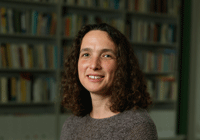
Margaret Litvin
Holder of an ACLS (American Council of Learned Societies)
Frederick Burkhardt Residential
Fellowship for Recently
Tenured Scholars, SCAS.
Associate Professor of Arabic and Comparative Literature,
Boston University, MA
After studying Italian literature and interdisciplinary humanities at Yale University (B.A. 1995),
Margaret Litvin worked as a journalist in New Orleans before entering graduate study at the
University of Chicago’s Committee on Social Thought, an interdisciplinary program spanning
political theory, philosophy and literature. She studied Arabic at Chicago and at the Center for
Arabic Study Abroad in Cairo (2001–02). Her Ph.D. thesis (2006) examined the many reworkings
of Shakespeare’s Hamlet in postcolonial Egypt, Syria and Iraq and grew into her first book,
Hamlet’s
Arab Journey: Shakespeare’s Prince and Nasser’s Ghost (Princeton, 2011). Tracing the
uses ofHamlet in Arabic literature, theatre and political rhetoric, and published just as the ‘Arab
Spring’
uprisings faded into disillusionment, the book shows how Arab intellectuals since the 1960s
have
seen themselves in Hamlet: their times ‘out of joint’, their political hopes frustrated by a corrupt
older generation.
At Boston University, Litvin teaches Arabic language and literature (in Arabic and in translation), as well
as seminars on translation, ‘Global Shakespeares’ and ‘1001 Nights in the World Literary Imagination’.
She is founding director of the Middle East & North Africa Studies Program in the Frederick S. Pardee
School of Global Studies (bu.edu/mena). Her articles, reviews and artist interviews have appeared in the
Journal of Arabic Literature,
Critical Survey, PAJ: A Journal of Performance and Art, TRI: Theatre
Research International, PMLA, several Shakespeare journals and the online venues Words Without Borders,
Marginalia Review of Books and n+1.
At SCAS, Litvin will work on her second book, a work of literary history tentatively titled ‘Another East:
Arab Writers, Moscow Dreams’, exploring the history of Arabic literary ties with Russia and the Soviet Union.
This information is accurate as of the academic year 2015-16.






